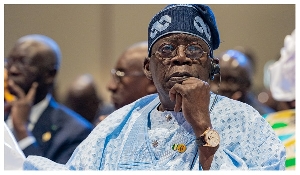 Nigeria's President Bola Tinubu
Nigeria's President Bola Tinubu
Let’s address the issues of recruitment and selection. Throughout history, leadership has been the force that alters the course of events. Consider the Bolshevik Revolution of 1917, spearheaded by leftist revolutionary Vladimir Ilyich Ulyanov, known as Vladimir Lenin.
It's evident that followers are merely supporting characters in the drama. Or, was it a determined leadership, exemplified by individuals like Awolowo, that brought about significant changes during the Action Group days? Did "the people" construct Ghana’s Volta Dam, a testament to tenacity and human courage, for which Kwame Nkrumah ultimately sacrificed?
In Nigeria, what is the approach to training a cadre? Mhairi Black was 20 years and 237 days old when elected to the British House of Commons, but she had been involved in politics since the age of 12.
Gordon Brown, who later became the British Prime Minister, was distributing leaflets for the Labour Party at just 13! In our context, politicians often pursue politics not out of genuine interest but as a means of survival. Most taxi drivers in Ghana have converted their vehicles from petrol to gas (LPG).
With competent leadership, shouldn’t Nigeria have achieved this milestone at least five years ago? Considering the abundance of cassava cultivation, shouldn’t there be ethanol plants converting cassava into ethanol?
Yes, we can implement all the Bimodal Voter Accreditation Systems (BVAS) in the world, but an election begins with the ease of registration and related processes. Given this, why has registration become burdensome in Nigeria? This was not the case in the past. Moreover, changing one’s registration, even without technology, used to take no more than two days.
Sadly, Nigeria’s current situation is vastly different. Consider the level of disenfranchisement in our universities; it's disheartening. The inability to vote, even with technological advancements, highlights the systemic issues. A student registered at Osun State University in Osogbo, now on a year-long national service in Calabar, should be able to vote seamlessly.
Yet, this isn’t the reality. A person who registered in Katsina State but has since relocated to Ogun State for work shouldn’t struggle to update their registration. With modern technology, this process should take mere minutes, especially considering the ease of electronic transactions between states.
Keiichiro Hirano, in ‘At the End of the Matinee,’ remarked: “People think that only the future can be changed, but in fact, the future is continually changing the past. The past can and does change. It’s exquisitely sensitive and delicately balanced.”
Undoubtedly, change is within the realm of possibility over time, driven by the collective will of a society’s critical mass. For change to occur, governance must be guided by individuals who comprehend the vision and can execute it smoothly. Fortunately, this administration is led by President Bola Tinubu, a streetwise leader with strong governance acumen.
Tinubu is expected to deliver due to his progressive track record. He notably opposed the Olusegun Obasanjo regime from a sensible federalist standpoint. Now, with the opportunity before him, Nigerians anticipate his commitment to a federalist state. The president must view himself first and foremost as a patriotic Nigerian, transcending tribal, religious, and sectarian biases.
Tinubu’s government should revisit the Uwais Report, which critiques various electoral deficiencies in Nigeria. Since governance and credible elections are intertwined, the neglect of this report by successive governments is detrimental to democracy.
In contrast to countries like Brazil, Australia, Argentina, and Seychelles, where voting is mandatory, Nigeria's voter turnout has steadily declined due to widespread apathy. Shouldn't our leaders consider mandatory voting? Unlike in more organized societies, Nigerian elections are perceived as mere quadrennial rituals.
Nigeria should contemplate Diaspora voting by now. Nigerians abroad contribute significantly to the economy yet lack the right to vote. Failure to address this disenfranchisement reflects poorly on Nigeria’s democratic progress.
Tinubu’s government should also advocate for a living wage to stimulate investment. This aligns with the Awolowo school of thought, viewing the living wage as an investment. Moreover, Nigeria must reconsider its constitutional framework, prioritizing production over consumption to ensure governance and elections are focused on development, not distribution.
The prevalence of vote-buying schemes, particularly among the uneducated, undermines progress. Eliminating this class dependency signals societal growth. Additionally, addressing the plight of the poor, who lack effective representation, is crucial for social cohesion.
In conclusion, Nigeria must return to the spirit of the 1963 Constitution to mitigate labor losses and promote peace. May the Lamb of God, who takes away the sins of the world, grant peace to Nigeria.